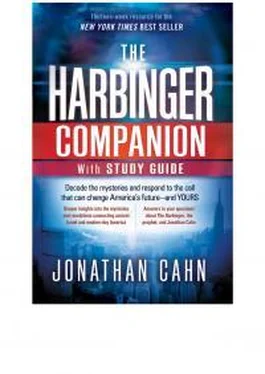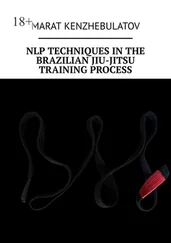Chapter 25
ABOUT the AUTHOR of The HARBINGER , JONATHAN CAHN
(Special Feature From FrontLine)
JONATHAN CAHN, THE author of The Harbinger, was born into a Jewish home, of the line of Aaron. His father came from Germany having escaped the Holocaust. His mother’s family came from Russia, having escaped the czar. Both his parents were scientists. As a boy he attended the synagogue from an early age. While in grade school he began to question what he was being taught. He perceived a disconnection between the God and faith of Bible times, where God appeared real and alive in people’s lives and in the history of Israel, and what he saw in modern synagogue life. So at the age of eight he became an atheist.
UFOs, Science, the Occult, and Everything Else
His years as an atheist lasted until he was about thirteen years old when he became increasingly disillusioned with atheism. The idea that there was no reason behind existence provided no answers and rendered life meaningless. He began to search for answers, reading book after book on everything from science, religion, the supernatural, the occult, UFOs, and whatever else offered to provide answers. One day he picked up a book that he thought was on UFOs. It wasn’t. It was The Late Great Planet Earth by Hal Lindsey. It was about the prophecies given in the Bible concerning the “last days,” which were now coming to fulfillment in modern times.
The Messiah
The book led him to start considering and then searching the Bible. He picked up a copy of the Old Testament and began reading it. He found within it the prophecies of the coming Messiah, one who would be born in Bethlehem (Mic. 5:2), ride into Jerusalem on a donkey (Zech. 9:9), die for sins (Isa. 53), and become the hope of the Gentiles (Isa. 11). All sorts of ideas he thought were non-Jewish he now found speaking of the Jewish Messiah in the Hebrew Scriptures. After a long search he began to believe that only one person could be the Jewish Messiah: Yeshua, Jesus.
The Deal
But this faith was an intellectual assent rather than a heart-based or life-changing decision. His life as a typical teenager remained unchanged. He began to tell his friends about what he was discovering. To his surprise, his friend’s lives began to change as they began to turn their lives to God. Jonathan began coming to the realization that it wasn’t enough to believe in one’s mind that Jesus was the Messiah.
He knew that although his belief was correct, his life wasn’t. And if he found himself face-to-face with God, he would be on the wrong side of judgment. A decision was needed. He had to decide to follow what he knew was right, to turn his heart to God, to commit his life, and to live as a disciple.
The problem was—he didn’t want to do any of these things. He believed that if you turned your life to God, it would be tantamount to joining a monastery. You would give up every good thing about life. And he wasn’t ready to do that. So he made a deal with God. The deal was this: if God would grant him a long life, he would turn his life over to God to follow Him . . . when he was about to die, on his death bed.
Crossing the Railroad Tracks
Soon after making that deal, Jonathan was almost killed—twice. The first incident involved a car accident, with his car swerving out of control in and out of lanes of oncoming traffic. It appeared a miracle that he wasn’t killed.
The second near-death experience was even more dramatic. Jonathan was nineteen, and he was driving a Ford Pinto at night, approaching a railroad track. The intersection was a dangerous one. There was no physical barrier stopping cars from the path of the train. The road was rough so that one might be on the track without realizing it.
He saw a light going on and off. He assumed it was the warning light signaling the coming of the train. But other cars on the other side of the street were crossing the track. He thought perhaps the train had already passed or that the light was broken. He moved his car forward to make sure. He looked to his left and saw a light. The light didn’t appear to be moving. It was the light of the approaching train. It didn’t seem to be moving because it was coming head-on.
Jonathan was on the track—but didn’t realize it. At one point, he thought that to be safe, it would be wise to back up. But now another car was in back of him shining its headlights into his rearview mirror. He couldn’t tell how much space he had. He backed up just slightly and was sure he was safe. He wasn’t. He was still in the path of the train.
After the Crash—the Mountaintop
The train approached the intersection and plowed into the Ford Pinto. The metal in the car became like aluminum foil. The only thing Jonathan could do in those moments was call out to God. The car was destroyed, but he didn’t get a scratch on his body. The event made headlines in the local paper, not only because of the crash but also because he didn’t get a scratch. After emerging from the collision, he pondered the fact that it was only a matter of inches that separated his life from eternity, from judgment, from heaven or hell. He remembered the deal he had made with God and realized that his deathbed could come much sooner than he had bargained for.
Confronted with the reality of death and eternity, he again spoke to God—now to renegotiate the deal. He wouldn’t wait until the time of his death to accept the Lord, which he now realized could come at any time. Instead, he would accept the Lord and start following the Lord . . . when he turned twenty.
About eight months later, on his twentieth birthday, coming to God as a man whose contract had run out and not knowing exactly what to do or how to do it, Jonathan got into his car and drove up a mountain overlooking the Hudson River. When he reached the top, he found a rock on which to kneel down. There on that mountaintop he committed his life to following God.
The Calling
Jonathan was in college, majoring in history, when his life changed. Outside of college he worked as a night watchman, doing schoolwork and studying the Scriptures. Soon he realized he was called into full-time ministry. He was asked to lead a Bible study, which he did for years. He started an outreach to the homeless of New York City, bringing them food and the Word of God. Upon graduating from college, he decided not to go on to postgraduate work but to find the calling the Lord had for him. He asked the Lord to give him a job that the Lord would have done. He was given a job working with disabled children.
Entering Into Ministry/Beth Israel
At the same time he was asked to help start an outreach called Beth Israel. He agreed to do it on the condition that those who asked him knew that his capacity in helping out would be temporary, subject to the time he would enter full-time ministry. A few years later the leader of the outreach left the ministry. Jonathan was approached to take the position. He was reluctant but eventually accepted.
When he accepted the position of leadership, there were about thirty-five people in the congregation. Soon it doubled, then tripled. The church in which the meetings took place asked the congregation to find their own place. But there was no money. One day a man showed up and told Jonathan that the Lord had told him to give Jonathan a gift of $150,000. With this, the congregation purchased its first building. Within a short time and much growth, the new building became too small for services. After much searching, another building was found, ten times the size of the first. During this time Beth Israel became one of the largest Messianic congregations in the world. Years later the congregation moved again, to a building three times larger than the last.
Читать дальше












